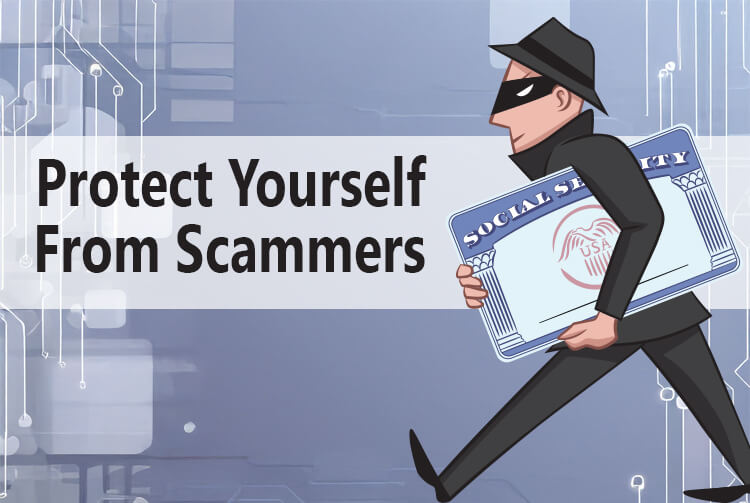Protect Yourself From Scams

Scams are everywhere, and it’s more important now than ever to be aware of suspicious communications that impersonate the Social Security Administration (SSA) and other government agencies. According to the FBI’s 2024 Internet Crime Report, victims of cybercrimes, including phishing, extortion, and personal data breaches, reported losses exceeding $16 billion in 2024.
Scammers use calls, texts, emails, social media messages, and letters to trick you into providing your personal and financial information. They can impersonate government agencies to obtain your personal information or money. Here’s how to spot a scam and what you can do to protect yourself.
Scams come in various forms, but they usually work the same way:
- Impersonation: Scammers pretend to be from an agency or organization you know to gain your trust.
- Creating urgency: Scammers say there is a problem or a prize and pressure you to act immediately.
- Specific payment methods: Scammers tell you to pay in a specific way.
Always remain skeptical and watch for these signs. If you receive a suspicious call, text message, email, letter, or social media message, the caller or sender may not be who they claim to be.
If you receive a suspicious communication from someone claiming to be from the SSA or another government agency:
- Take your time. If you feel uneasy about a suspicious call, email, or message, talk it over with someone you trust before reacting.
- Hang up or ignore the message. If you receive a call or text message from an unknown number, don’t answer. It’s not rude to protect yourself! If you must call them back, look up the number on the official website instead of responding to the number that contacted you.
- Secure your finances. Scammers will insist you use a hard-to-trace payment method, such as a gift card, prepaid debit card, cryptocurrency, wire transfer, money transfer, or cash.
- Protect your personal information. Never provide sensitive information to someone just because they claim to be from a government agency.
- Spread the word. Help protect your friends and family from scammers by sharing this information.
- Report the scam. Visit the SSA website to report a Social Security or government imposter scam.
MOSERS will not request your sensitive information via email or text. Avoid clicking on links or downloading attachments from unknown sources, as they may be phishing scams designed to steal your personal information. Remember, we won’t email you to ask for your:
- Date of birth
- Social Security number
- Member ID
- Online ID
- Any other personal information
If you contact us, we will ask you a series of questions to verify your identity before releasing any information. We may ask for some of the above information, but again, only if you contact us.
Scammers frequently change their approach with new tactics and messages to trick people. If you receive a message from MOSERS and are unsure if it’s a phishing attempt, please contact our office, and we can verify whether MOSERS sent it.
For more information, visit USAGov's website to use their Where to Report a Scam tool. You can also learn more about what to do if you were scammed on the SSA’s Scam Awareness page.


